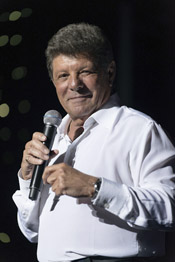Frankie Avalon Reflects on His First Love
 Valentine’s Day: A time when people look for love, pray for love, and love to be loved. New love is found and old love renewed.
Valentine’s Day: A time when people look for love, pray for love, and love to be loved. New love is found and old love renewed.
Francis Thomas Avallone, for one, remembers the very moment he first fell in love.
“I went to a movie on a Saturday afternoon,” says Frankie. “My mom used to pack me a little lunch, and my cousins and I would stay all day and watch the cartoons.”
“This day there happened to be a picture along with the cartoons called ‘Young Man With a Horn.’ It starred Kirk Douglas and the music was [dubbed in] by Harry James. It was a story about a boy who found this horn and became a very successful trumpet player. I kind of related to it and I loved the sound of the horn.”
“I came home and told my dad that I’d like to play a trumpet and he was thrilled because he was very musical, a natural talent. In those days, money was kind of tight but he went to a pawn shop and bought me my first horn. I took the horn into my room, and I didn’t come out until I played a song: ‘Music! Music! Music!’ (Teresa Brewer’s 1950 No. 1 hit.) I was 10 years old.”
From that day on, Frankie and his trumpet were inseparable. “I tried to do it as best as I could and finally I was told [that I had] some talent. I found a teacher named Seymour Rosenfeld who was second trumpeter with the Philadelphia Orchestra.
Eventually, the word got out that this Frankie kid was something of a prodigy and, in an only-in-America story, the 13-year-old got a record deal. “I was discovered by a singer from the neighborhood who had a No. 1 song (“Here in My Heart”): Al Martino. I knocked on his door. There was a big party going on, and I asked if I could play my horn. They let me in and Al Martino said, ‘Who’s this kid? We gotta take him into New York.’ I auditioned for a big agency [and then] they took me into the Sheraton Hotel and I auditioned for Jackie Gleason. He was there with his writers and he said, ‘Write a show, I want him on.’”
The very positive response to Frankie’s appearance on Gleason’s show ultimately led to RCA Victor, where he recorded an EP (“Very Young Man With a Horn”). In March of 1954, a single track — “Trumpet Sorrento” — reached No. 42 on the Cash Box national pop chart. (The label billing of “11-year-old Frankie Avalon” shaved two years off his actual age.)
Back home, Frankie signed on with Rocco and His Saints (with whom his childhood friend Bobby Rydell occasionally sat in on drums) as a horn player. Apart from a spontaneous, one-off performance of Frank Sinatra’s “Five Minutes More” at a Saturday movie matinee talent contest when he was 6, Frankie says, “I didn’t sing until I was about 16 and the only reason why was that people would crowd the stage and ask me to until finally Rocco said, ‘If you sing, I’ll give you an extra five bucks’ and I said, ‘OK, I’ll sing.’ I did ‘Sixty Minute Man’ (not exactly the most romantic song) and whatever was popular: just a few songs.”
As luck would have it, Chancellor Records signed Rocco and the gang, releasing a single with an A-side Avalon vocal, “Cupid” (not the Sam Cooke hit from 1961). Although radio gave “Cupid” and its follow-up single, “Teacher’s Pet” (not the Doris Day tune) a few spins, his singing career on record didn’t exactly take off.
Then came Chancellor 1011. Singing in a high-pitched voice may seem like an inauspicious start on the road to stardom as a crooning heartthrob of teenage girls, yet that’s how it played out for Frankie. Clarifying his vocal technique on “DeDe Dinah,” he says with a laugh, “I sang through my nose; I didn’t hold my nose.”
It was all a lark for the 17-year-old. “I was just fooling around. Pete (DeAngelis, the song’s co-writer) heard me and said, ‘Let’s put a few down like this. It’s got a sound.’ And I said, ‘You’re kidding!’” Pete wasn’t and, much to Frankie’s surprise, “Dinah” peaked at No. 7 on Billboard magazine’s national pop chart in mid-February 1958.
His next Top 10 — “Ginger Bread” — featured another nasal vocal performance: one unlikely to set girls’ hearts a-fluttering.
That changed with Frankie’s next single release, the B-side of which — “I’ll Wait for You” — found him in full-on crooner mode, backed up by The Four Dates. American teens now had, along with Paul Anka, a second teen idol. “I’ll Wait” easily bested the A-side, going to No. 15 on the Billboard Hot 100.
Recalls Frankie, “(Chancellor records owner) Bob Marcucci and Pete DeAngelis wanted to [make me] into a young, romantic vocalist, and that really started the swooning.” The stage was set for his big breakthrough.
“Ed Marshall came to my house, knocked on the door and said, ‘I’m a songwriter. Can I come in and play my song for you?’ We had a piano, and he sat down, and the first time I heard “Venus” I flipped over it.” I picked up the phone and called Bob and Pete. They set up a recording session at Bell Sound (in New York City) in three days and put it out.”
“Venus” debuted at No. 99 in early 1959 and bolted to No. 1 in just four weeks, where it remained for five. With “Venus,” everything changed. Gone were the up-tempo novelties, replaced by musical love letters for post-WWII teens. “Bobby Sox to Stockings” b/w “A Boy Without a Girl” — both Top 10 sides. “Just Ask Your Heart” and “Why,” the latter another chart-topper. (Video: See Frankie then and now perform his hit song, "Venus.")
“The songs were good,” says Frankie, “and they hold up because they’re performances. Pete had a knack of writing a song within a song. When ‘Venus’ starts out, there’s a line that goes all through the song (riffs) ‘DAH-da-da-DAH, DE-da-da-da-DAH.’ And that line, along with the melody of the song, made two songs in one. There was never, ever a dull moment in those records.”
Although “Why” was followed by other fine tracks — notably “Where Are You” and “You Are Mine” — they sold less well as musical tastes changed and Frankie shifted his focus from Philly to Hollywood.
In his first dramatic role, Frankie was on screen with Alan Ladd (in “Guns of The Timberland”) and for his second film, John Wayne (“The Alamo”). Asked what it was like for a novice actor to work with the likes of Ladd and Wayne, Frankie says, “It was like walking out on a stage and singing ‘Five Minutes More’ — you just go do it. Your legs shake, but you make it look like it’s natural.”
Of the almost 30 movies that Frankie appeared in, it was a series of fun films, quickly made, for which he’s best remembered. “I did ‘Panic in Year Zero’ (in 1962),” says Frankie, “A little picture directed by Ray Milland that got very good notices from the press. I got very friendly with Lou Rusoff who was [one of the producers and] a writer. I told him how much I liked the Dead End Kids when I was growing up, because it was an ensemble, and they were fun.”
“He came back about a month later [with] ‘Beach Party.’ They started casting and said [they were] going to get Annette Funicello and I said, ‘That’s great. I know Annette. She’s terrific and she’s got a great following.’”
“I first met her when we were both doing the Hollywood Bowl for Dick Clark. She was younger, like 15, and I was maybe 18 or 19. I went to her house, picked her up, and we went and had a slice of pizza. That was our first and only date, but we [became] great friends.”
“Beach Party” was a big hit with kids and created an entire like-named genre of film. Between 1963 and 1965, Frankie and Annette starred in five of them. In 1987, they revived their on-screen romance, this time as husband and wife, for “Back to the Beach.”
By then, Annette had begun to suffer symptoms of multiple sclerosis. When she passed away in 2013, Frankie recalled his beloved friend for The Toronto Star. “She was a great gal. So loved. And she never understood why. I’d [come] off the road from my concert tours and say, ‘Everyone loves you and asks for you, Annette,’ and she couldn’t understand why. She never liked the limelight. I think about her all the time.”
His on-screen romancing aside, Frankie’s real-life love life has been wildly successful: married 52 years and counting.
According to Frankie, it was love at first sight. “I was playing cards at my house with some buddies, [when] Rona Barrett, came in with Kay. I left the game and we had a great conversation. She walked out of the house and I came back in and said to the guys, ‘I’m going to marry that girl.’ And that was it. We got married five months later. Today, we have eight children and 10 grandchildren.”
Frankie’s recording and film career enjoyed a resurgence in the mid-1970s, when producer Billy Terrell approached him about a disco version of “Venus.” At first, Frankie was skeptical. “I said, ‘I can’t touch that song; it’s a classic.’ He went to the piano and started to do it with all the fills and other stuff, and I thought, ‘Gee, that sounds interesting.’” Interesting, indeed. In 1976, former teen idol Frankie was back — at 35 — with a No. 1 Adult Contemporary hit.
Two years later, Frankie appeared in “Grease,” the top-grossing movie musical of all time, as the ultimate Teen Angel, singing “Beauty School Dropout” for a new generation.
Over the years, Frankie’s career, like that of all entertainers, has had its ups and downs. Still, he says, “I’ve loved every moment of it. When there were the lean times — and I sure had mine when the music changed — those were probably the most creative and exhilarating times for me because they gave me an opportunity to do things in my show that I’ve always wanted to do: do impressions and dance. I put the horn in. The show was very important to me.”
It still is. “There’s someone new in my show who is just sensational: Edan Everly, Don Everly’s son. There are some new film clips; I’ve got a whole family album that I show. Then, of course, we do the songs that the fans want to hear.”
“The cruise with Time Life is terrific; I always refer to it as a Mardi Gras on the seas. It gives me a chance to thank a lot of people, to see them enjoying a memory that is very important to all of us. That’s what we all have no matter what generation you’re from: memories.”
— Ed Osborne © 2015
